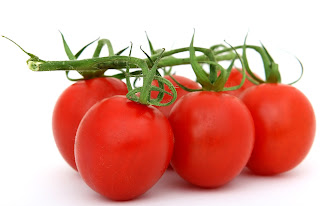The 5 Best Low-Carb Vegetables
1. Tomatoes
Tomatoes have a number of impressive health benefits.
Like avocados, they are technically fruits but usually consumed as vegetables.
They’re also low in digestible carbs. One cup (149 grams) of cherry tomatoes contains 6 grams of carbs, 2 of which are fiber.
Tomatoes are a good source of vitamins A, C and K. In addition, they’re high in potassium, which can help reduce blood pressure and decrease stroke risk.
They’ve also been shown to strengthen the endothelial cells that line your arteries, and their high lycopene content may help prevent prostate cancer.
Cooking tomatoes increases lycopene content, and adding fats such as olive oil during cooking has been shown to boost its absorption.
2. Radishes

Radishes are Brassica vegetables with a sharp, peppery taste.
One cup (116 grams) of raw sliced radishes contains 4 grams of carbs, 2 of which are fiber.
They’re fairly high in vitamin C, providing 29% of the RDI per serving.
Additionally, radishes may reduce the risk of breast cancer in postmenopausal women by modifying the way the body metabolizes estrogen.
3. Onions
Onions are a pungent, nutritious vegetable.
Although they are fairly high in carbs by weight, they’re usually consumed in small amounts because of their robust flavor.
A half cup (58 grams) of sliced raw onions contains 6 grams of carbs, 1 of which is fiber.
Onions are high in the antioxidant quercetin, which may lower blood pressure.
One study in overweight and obese women with polycystic ovary syndrome (PCOS) found that eating red onions reduced LDL cholesterol levels.
4. Eggplant
Eggplant is a common vegetable in many Italian and Asian dishes.
A one-cup (99-gram) serving of chopped, cooked eggplant contains 8 grams of carbs, 2 of which are fiber.
It’s not very high in most vitamins or minerals, but animal research suggests eggplant may help lower cholesterol and improve other markers of heart health.
It also contains an antioxidant known as nasunin in the purple pigment of its skin. Researchers have reported that nasunin helps reduce free radicals and may protect brain health.
5. Cabbage
Cabbage has some impressive health benefits.
As a cruciferous vegetable, it may help reduce the risk of certain cancers, including esophageal and stomach cancer.
One cup (89 grams) of chopped raw cabbage contains 5 grams of carbs, 3 of which are fiber.
It also provides 54% of the RDI for vitamin C and 85% of the RDI for vitamin K.
CREDITS: https://www.healthline.com/nutrition/21-best-low-carb-vegetables








Comments
Post a Comment